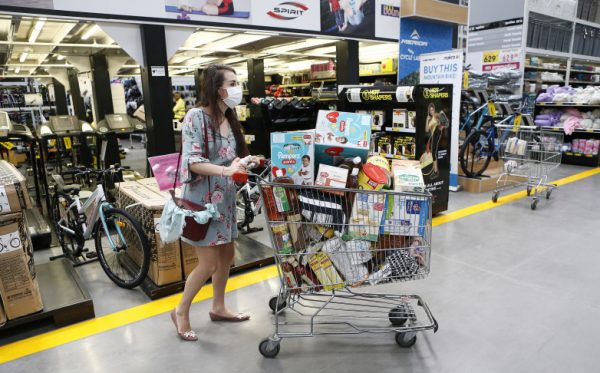
As the number of coronavirus cases in Los Angeles County continues to climb, we’re constantly reminded to stay “safer at home” and focus on social distancing. And we’re doing it. (Good job, Angelenos! Except for you, Manhattan Beach surfer.) But at some point during this pandemic, most of us will need to buy groceries. With news that a handful of grocery store employees have tested positive for coronavirus, shopping for food can feel like a gamble.
What kinds of risks are we taking when we go to the supermarket? What about when we eat food?
Here’s everything we do and don’t know, so far, about COVID-19 and food — and here’s what you can do to minimize your risk.
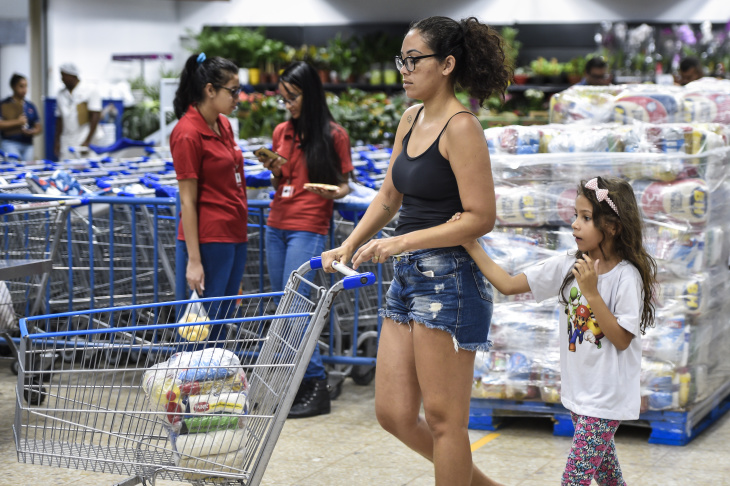
How does COVID-19 spread?
COVID-19 mostly spreads from person to person — even when people aren’t showing symptoms — usually via the tiny droplets you spew when you cough or sneeze. It’s also possible for the virus to spread when a person touches a surface contaminated with coronavirus then touches their mouth, nose or eyes. However, the CDC notes that this type of transmission is not the main way the virus spreads.
How long can COVID-19 survive on a contaminated surface?
Scientists aren’t certain. Here’s what we know. A study published in The New England Journal of Medicine found that the virus can be detected:
- up to 24 hours on cardboard
- up to 48 to 72 hours on plastic surfaces
- up to 48 to 72 hours on stainless steel surfaces
This is a good starting point for understanding how COVID-19 works but it may not reflect real world conditions. “What we have, at present, are some very preliminary experiments,” says Dr. Paula Cannon, a professor of molecular microbiology and immunology at USC’s Keck School of Medicine.
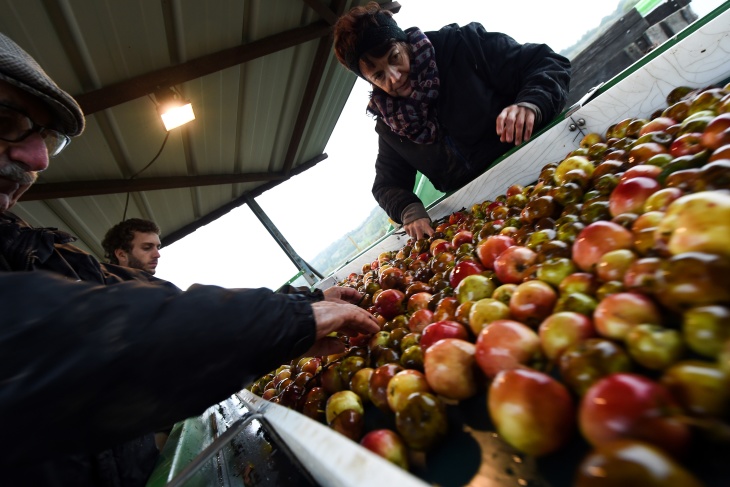
What if I eat food with coronavirus on it? Will I get sick from eating it?
Probably not. The USDA and the FDA say they haven’t seen any evidence that COVID-19 has been transmitted through eating food.
Wait, why not?
Let’s say a grocery store employee who doesn’t know they’re infected with COVID-19 coughs while unpacking food boxes and some of their respiratory droplets (laden with virus particles) land on a bunch of apples. These apples go onto the shelves, you buy one with coronavirus on its surface and, for whatever reason, decide not to wash it (seriously? why?) before you eat it.
From what we currently know, foodborne transmission of the coronavirus is unlikely. Viruses, unlike bacteria, can’t grow in your food. With the passage of time, the amount of coronavirus on the surface of our theoretical apple would decrease. But even if you chomp down on this unwashed, “infected” apple, the coronavirus probably won’t survive the acid in your stomach.
“The food itself is fine,” says Dr. Catherine Carpenter, an adjunct professor of medicine, nursing and public health at UCLA’s Center for Human Nutrition.
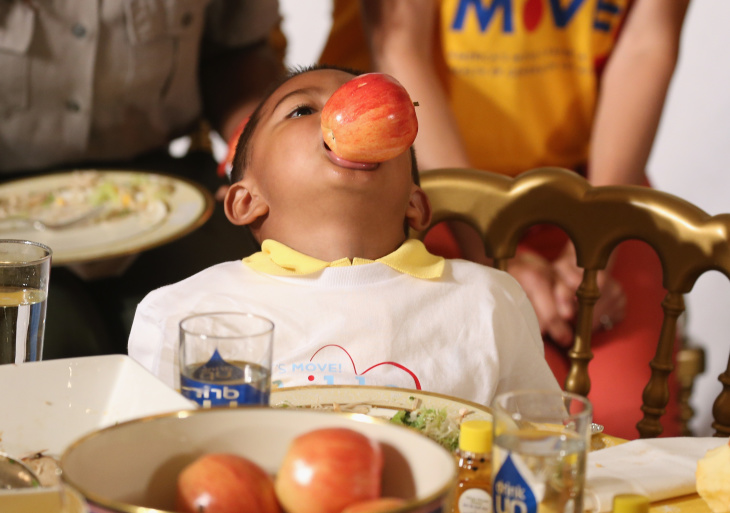
OK, but what if I touch an apple, or a can of beans, that has the virus on it, and then I touch my face? Will I get sick?
First, please stop touching your face, especially when you’re out in public.
There is no evidence of transmission of COVID-19 via food, food containers or food packaging, according to the FDA. However, as with other viruses, it is possible for COVID-19 to survive on certain surfaces. So, if someone was quite sick with the virus and they sneezed on a can and you picked it up at the exact right moment (remember, the virus degrades as time passes) then touched your face, could you get sick? It’s possible, but not likely.
“The virus spreads through respiratory droplets that come from breathing. The USDA and the CDC have concluded that there isn’t any evidence for the virus to be transmitted through food packaging,” Dr. Carpenter says.
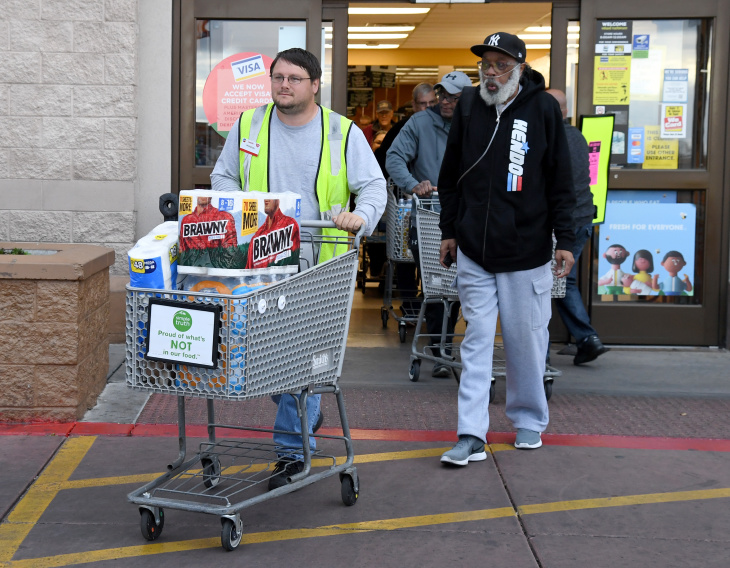
How do I protect myself at the grocery store?
1. Try to go at a less busy time.
These days, it’s hard to know when that is. Earlier in the day, especially when your market opens, is better and weekdays seem to be less busy than weekends at most stores.
2. If you’re a senior or in another high-risk group, take advantage of the “senior shopping hours” many stores have introduced.
Typically, for the first hour of their day, these markets will only allow seniors or people who are immunocompromised to come in. Some stores go an extra step by limiting the number of people who can be in the store during these shopping windows. If you feel it’s still too risky for you to go inside, at some stores, like Grocery Outlet in Altadena, volunteers who are present during their senior shopping hours will take your grocery list, do your shopping and bring your goods back to your car.
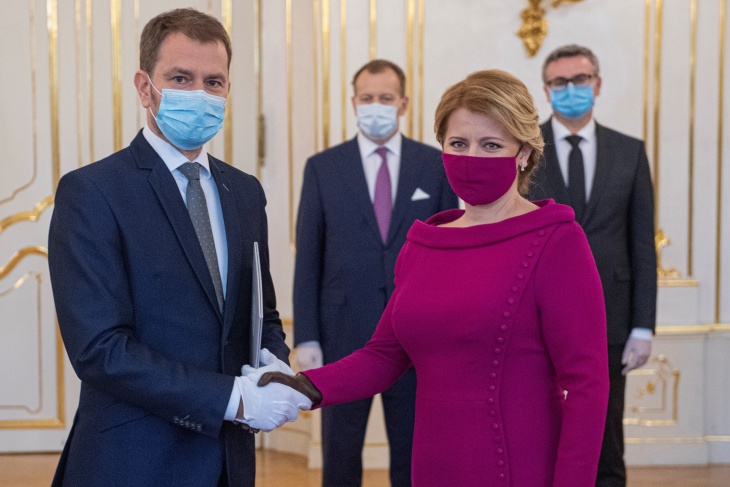
3. Wear a mask if you have one.
The CDC is reportedly considering guidelines that would urge Americans to wear masks whenever they’re in public. Those aren’t in effect yet but it couldn’t hurt to do either or both of these things. For the moment, the CDC doesn’t recommend wearing masks in public unless you’ve “been exposed and are displaying symptoms of the virus.” Save the N95 and surgical masks for medical professionals.
4. Wear latex gloves if you have them.
Latex gloves aren’t meant for hard use and they tear easily, especially when you’re doing tasks like pumping gas or hauling heavy items. If you decide to wear them, avoid touching your face. If the virus is on your gloves and you scratch your nose with a gloved hand, then you’ve defeated the purpose of wearing protection in the first place. When taking off your gloves, do not touch your bare skin. Follow this CDC guide for removing latex gloves.
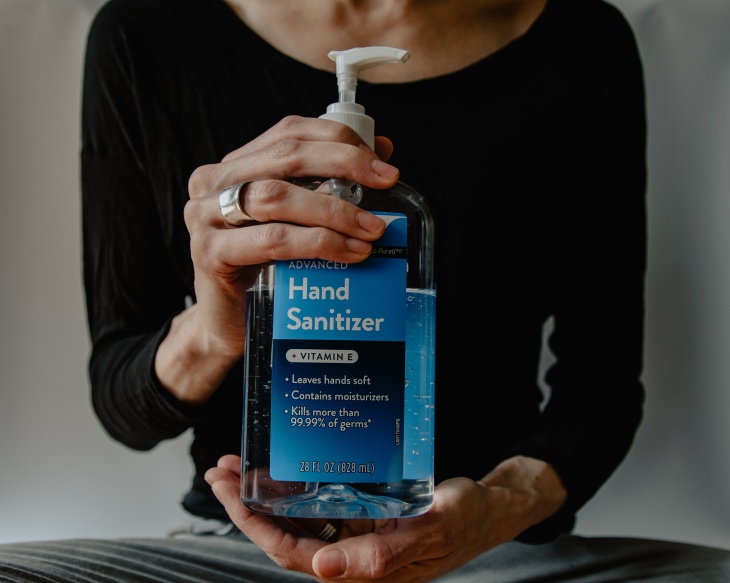
5. If you don’t have gloves, use hand-sanitizer.
Before going into the store, give your hands a good squirt with a sanitizer that contains at least 60% alcohol. If you don’t have your own, some stores now have a station near the entrance where you can do this. For a little additional peace of mind, if you don’t have gloves and don’t have sanitizer handy, you can use an extra plastic produce bag for handling certain items or produce.
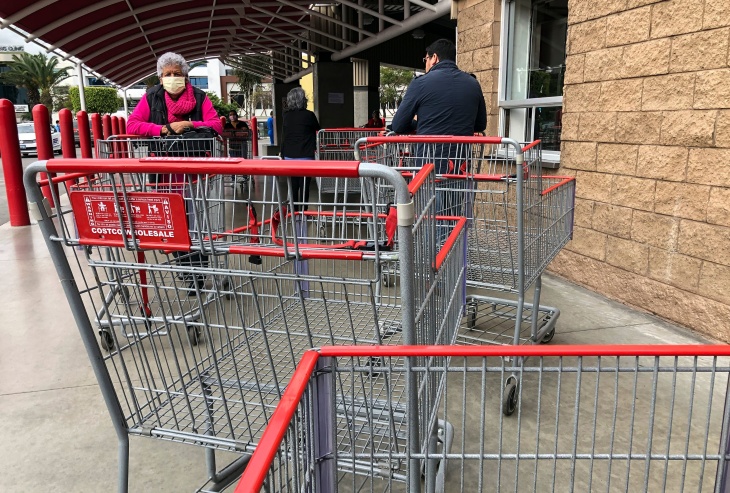
6. Before you touch your cart, wipe it down with an antiseptic wipe.
Some stores are now offering wipes for this purpose. They’ll usually be near the entrance.
7. While you’re in the store, stay at least 6 feet away from other shoppers.
This should be obvious.
8. While you’re in the store, touch as few things as possible.
“How am I going to limit what I touch with my hands? I probably can’t reduce that to zero but I need to think about ways of protecting myself and other people around me,” Dr. Cannon says. A good example of this is the checkout process. Whether you use the normal checkout line or the self-checkout, and whether you use cash or credit, you’ll have to touch a surface that others have touched. Don’t worry. Just remember to not touch your face and to wash your hands as soon as you get home.
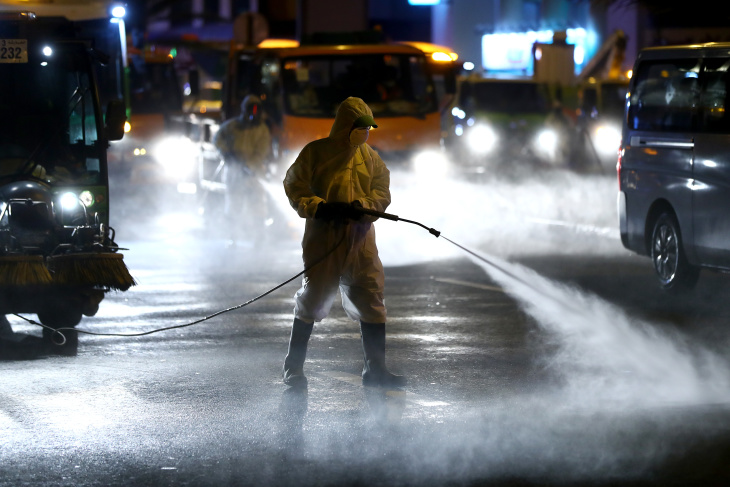
Do I need to change my clothes when I get home from the grocery store?
Nope. “We don’t feel fabrics are going to be a major source of transmission here,” Dr. Robert Kim-Farley, with UCLA’s Fielding School of Public Health, and a former CDC staffer, told LAist. “It really primarily is this droplet spread, coughing and having that breathed in. It’s also surfaces — especially surfaces like metal or plastics — that the virus can maybe last… up to two days on that type of a surface.”
What should I do when I get home from the grocery store?
After you bring your groceries inside, the first thing you should do is wash your hands thoroughly! Make sure to do this BEFORE you start unpacking your groceries. Here’s how to wash your hands the right way.
How should I unpack my groceries?
Frank Yiannas, the FDA’s Deputy Commissioner for Food Policy and Response, noted in a statement on March 24, “There is no evidence of human or animal food or food packaging being associated with transmission of the coronavirus that causes COVID-19.” As we’ve mentioned, the primary way the virus spreads is person-to-person, which is why social distancing and minimizing trips outside your home is so critical.
Despite whatever viral videos are floating around, you don’t need to wipe down every single can and container you bring home, you definitely shouldn’t leave your groceries on your porch for three days (your perishable items will spoil) and you don’t need to wash your produce with bleach or soap (more on that in a minute).
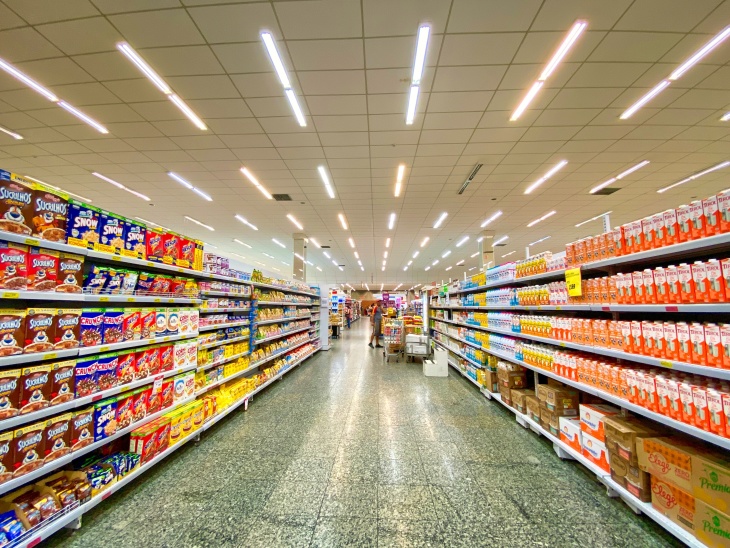
How can I be safe with food containers?
Since you don’t eat the containers your food comes in (unless you’re doing some sort of weird performance art), the main issue here is potential transmission via your hands. WASH YOUR HANDS. Thoroughly and often. And avoid touching your face.
If you’re concerned your box of pasta is contaminated, after you’ve stored it on your shelves, avoid touching your face and wash your hands. If you want to go the extra mile, Dr. Cannon recommends organizing your items in the fridge or cupboard by expiration.
“The virus is killed by soap and detergents and household cleaners but it’s also killed by time,” Dr. Cannon says. If the virus was present on those items when you bought them, by the time you use said item, days or weeks later, it should be fine.
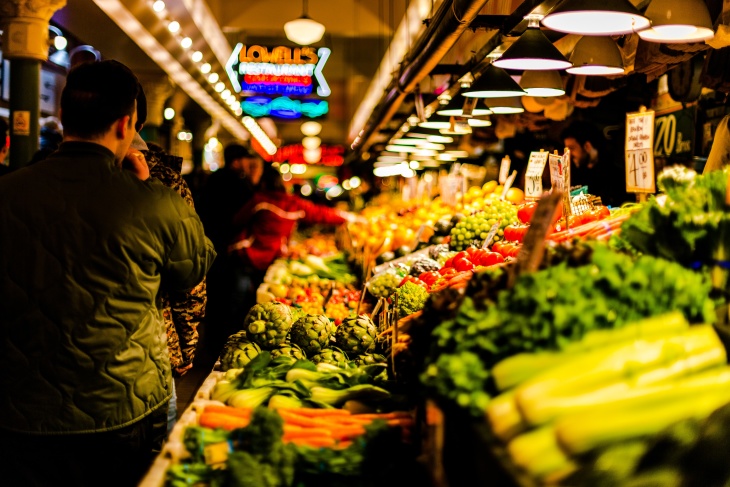
What about raw produce?
“It’s a good practice to rinse off your fruits and veggies before putting them away,” Dr. Carpenter says. “And if you want, wipe down a package with antiseptic wipes, too.”
Should I wash my fruits and vegetables with soap?
You don’t need to do that. In fact, the USDA says you shouldn’t wash your produce with detergent or soap. Residue from soaps and detergents can be absorbed by the produce and ingesting the residue can make you ill. When washing your produce, stick with cold, running water.
“There’s a real hierarchy of impact that you can have both on your own safety and other people’s safety. And down at the bottom of that hierarchy is washing your apple,” Dr. Cannon says.
You’ve probably picked up on a trend here. Organizing your items by expiration and washing your produce are good, common sense practices that you should always do, coronavirus or not.
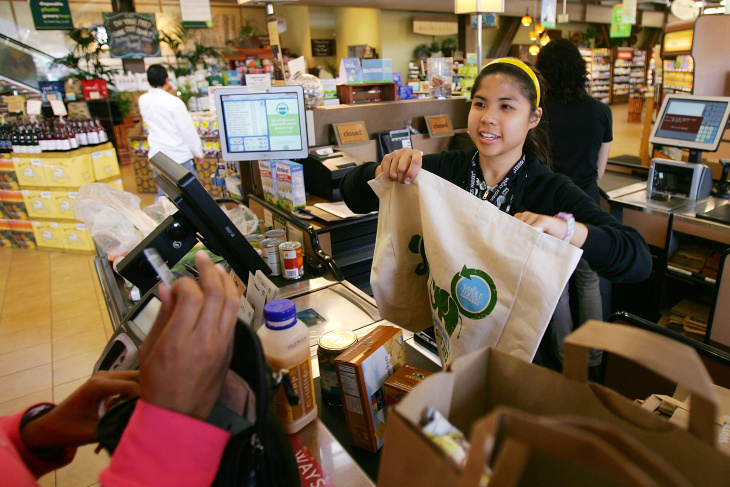
What do I do with the bags my groceries came in?
If you’re using machine-washable nylon or cotton bags, go ahead and wash them after you’ve unpacked your groceries. If you’re using reusable bags that can’t be washed, wipe them down, inside and out, with an antiseptic wipe.
After I’ve unpacked my groceries and sorted through my bags, what should I do?
WASH YOUR HANDS! Make sure to do this before you start snacking or preparing a meal.

What else should I do?
First and foremost, stay home unless absolutely necessary.
Second, wash your hands and don’t touch your face.
Finally, try to stay calm. Fear can be good if it helps you prepare for a difficult situation but it can also be destructive. “Half the battle right now is our own anxiety,” Dr. Carpenter says.
I’m bored. What’s the TL;DR of this story?
Here’s the takeaway: You probably won’t get sick from eating food contaminated with coronavirus but you might get sick if you touch food or food containers contaminated with the virus and then touch your face. So…
- Wash your hands — a lot
- Stay home as much as possible
- Stay at least six feet away from other people when you go out
- Touch as few things a possible when you go out
- Wash your hands as soon as you get home
- Wash your hands again after you unpack your groceries
- Be a decent human being
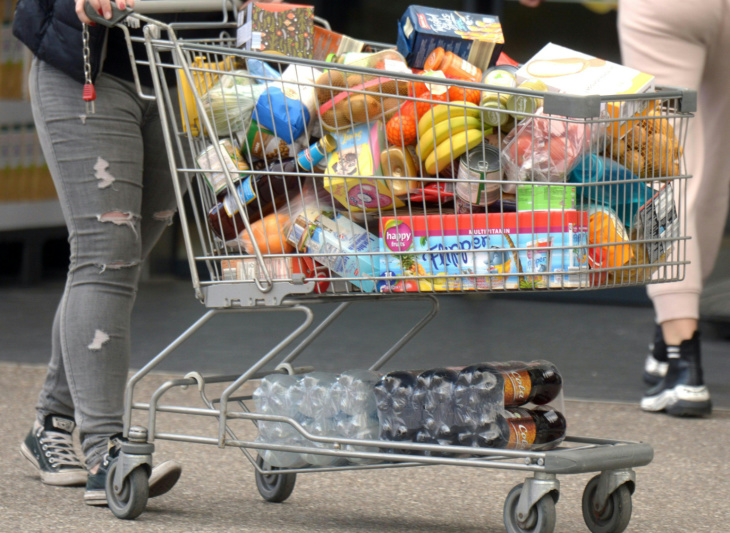
A person pushes a full shopping cart with various groceries on March 13, 2020, in Stockerau in Tyrol, Austria. (Herbert Pfarrhofer /APA/AFP via Getty Images)
MORE ON CORONAVIRUS:
Get our daily newsletter for the latest on COVID-19 and other top local headlines.
Terms of Use and Privacy Policy
Support our free, independent journalism today. Donate now.